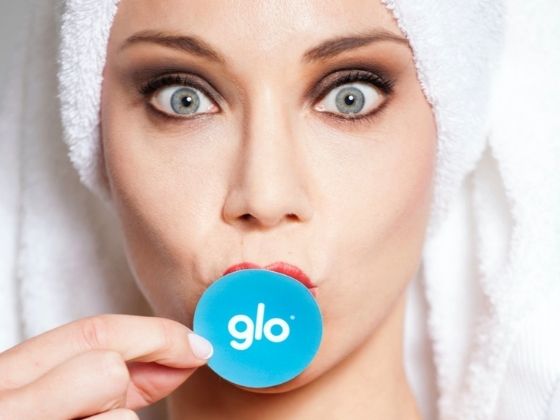Glo Mask is a medical device certified in Europe and the United States (FDA) that uses phototherapy technology for skin rejuvenation. Phototherapy is a tested and safe technology, but there are some cases of light sensitivity to consider before using this technology for skin care.
CONTRAINDICATIONS
- DO NOT share Glo Mask with any other person. Glo Mask is for individual use only.
- DO NOT use Glo Mask to treat any condition other than those listed in the directions for use. Glo Mask has not been tested for conditions other than those listed and the risk is unknown.
- DO NOT use Glo Mask if you are pregnant, plan to become pregnant or are breastfeeding. Glo Mask has NOT been tested on pregnant or nursing women, so the risk to the fetus, newborn or pregnant woman is unknown.
- DO NOT use Glo Mask if you suffer from light-induced headaches.
- DO NOT use Glo Mask if you are allergic to silicone. The treatment surfaces of Glo Mask contain medical silicone.
- DO NOT use Glo Mask if you have a genetic eye disease. If you are unsure if you have an eye condition related to the use of Glo Mask, contact a healthcare professional.
- DO NOT use Glo Mask if you have lupus erythematosus, photosensitive eczema or albinism. Using Glo Mask to treat lupus erythematosus, photosensitive eczema or albinism may cause a severe skin reaction.
- DO NOT use Glo Mask if you have a photosensitive disorder (light sensitization). If you use Glo Mask and you have a photosensitive disorder, it may cause a severe skin reaction.
- DO NOT use Glo Mask if you are taking any medication that may cause photosensitivity. If you use Glo Mask and are taking any medication that may cause photosensitivity, it may cause a severe skin reaction.
Photosensitivity is a common side effect of various medications.
These include some antibiotics, chemotherapy drugs and diuretics. If you are not sure which medication you are taking, consult your physician.
Other substances not listed above may also cause photosensitivity.
Common examples of these substances are: St. John's wort, coal tar, deodorants, antibacterial soaps, artificial sweeteners, naphthalene (mothballs), petroleum products, brightening agents present in laundry detergents, and cadmium sulfide (a chemical injected into the skin during tattooing).
In some cases, the Glo mask may be unsuitable for an individual. Certain diseases or medications may make a person unsuitable for treatment.
It is not recommended to use LED phototherapy if you are taking medications that cause photosensitivity.
List of drugs that can cause photosensitivity
If you are taking any of the medications listed below, please read the comments section of the table carefully.
Coal tar, Minoxidil (Rogaine).
Type of drug |
Specific group or common name
|
Comments |
|
Anti-arthritic |
Gold 50 or Ridaura |
If yes, treatment cannot be administered. |
|
Anti-arthritic or Immunosuppressant |
Azathioprine (Imuran, Azasan) |
If yes, treatment can be administered as long as medication has not been taken in the last 5 days. |
|
Antiarrhythmics |
Amiodarone (Cordarone, Pacerone), Aratac |
If the answer is YES, the treatment can be administered as long as the drug has not been taken in the last 5 days. |
|
|
Quinidina |
If the answer is YES, and the client is currently taking the medication, it is at the client's discretion whether or not to initiate treatment. There is a 10/100 chance of a mild reaction. If the client has been off the medication for ≥ 5 days, then treatment can be administered. |
|
Antibiotics |
Fluoroquinolones: Ciprofloxacin (Cipro), Levofloxacin (Levaquin), Lomefloxacin (Maxaquin),Norfloxacin (Noroxin), Ofloxacin (Floxin). Tetracyclines: Demeclocycline (Declomycin), Doxycycline (Vibramycin), Minocycline (Minocin), Oxytetracycline (Terramycin) Others: Azithromycin (Zithromax), Capreomycin (Capastat), Ceftazidime (Fortaz), cycloserine (Seromycin), Metronidazole (Flagyl), nalidixic acid (NegGram), pyrazinamide, sulfamethoxazole/trimethoprim (Bactrim). |
If yes, treatment can be administered as long as the drug has not been taken within the last 5 days. |
|
Anti-Carcinogens |
Bexarotene (Targretin), Capecitabine (Xeloda), Dacarbazine (DTIC), Epirubicin (Ellence), Fluorouracil (5-FU), Interferon alfa (Intron A, Alferon-N), Methotrexate (Mexate), Pentostatin (Nipent), Procarbazine (Matulane), Oral tretinoin (Vesanoid), Vinblastine (Velban, Velbe). |
If the answer is YES, and the client is currently taking the medication, it is at the client's discretion whether to initiate treatment. The likelihood of a mild reaction ranges from 1/100 to 5/100. If the client has been off medication for ≥ 5 days, then treatment can be administered. |
|
Anticonvulsants |
Carbamazepine (Tegretol), Felbamate (Felbatol), Gabapentin (Neurontin), Lamotrigine (Lamictal), Oxcarbazepine (Trileptal), Topiramate (Topamax), Valproic Acid (Depakene). |
|
| Antifungals | Flucytosine (Ancobon), Griseofulvin (Fulvicin, Gris-PEG), Terconazole (Terazol), Voriconazole (VFEND). |
|
|
Antihistamines |
|
|
|
Antihypertensives |
Captopril (Capoten), Diltiazem (Cardizem, Tiazac), Enalapril (Vasotec), Nifedipine (Procardia), Sotalol (Betapace) |
If yes, treatment can be administered as long as the drug has not been taken within the last 5 days. |
|
Antimalarials |
Chloroquine (Aralen), Hydroxychloroquine (Plaquenil), Pyrimethamine (Daraprim), Pyrimethamine/Sulfadoxine (Fansidar), Quinine |
If yes, treatment can be administered as long as the drug has not been taken within the last 5 days |
|
Antipsychotics |
Phenothiazines: Chlorpromazine (Thorazine), Fluphenazine (Prolixin), Perphenazine (Trilafon), Prochlorperazine (Compazine), Thioridazine (Mellaril), Trifluoperazine (Stelazine) |
If the answer is YES, and the client is currently taking the medication, it is at your discretion whether to initiate treatment. There is a 2/100 to 3/100 chance of a mild reaction. If the client has been off medication for ≥ 5 days, then treatment can be administered. |
|
Antiretroviral |
Ritonavir (Norvir), Saquinavir (Fortovase, Invirase), Zalcitabine (Hivid) |
f the answer is YES, and the client is currently taking the medication, it is at the client's discretion whether or not to initiate treatment. There is approximately a 2/100 chance of a mild reaction. If the client has stopped taking the medication for ≥ 5 days, then treatment can be administered. |
|
Antiviral |
Amantadina (Symmetrel), Aciclovir (Zovirax) |
If the answer is YES, and the client is currently taking the medication, it is at the client's discretion whether or not to initiate treatment. There is approximately a 1/100 chance of a mild reaction. If the client has stopped taking the medication for ≥ 5 days, then treatment can be administered. |
|
Cardiovascular |
Thiazid diuretics: Bendroflumethiazide (Corzide), Chlorthalidone (Thalitone), Hydrochlorothiazide (Microzide), Hydroflumethiazide (Diucardin), Indapamide (Lozol), Methiothiazide (Enduron), Metolazone (Zaroxolyn), Polythiazide (Renese). Diuretics, Others: Furosemide (Lasix), Triamterene (Dyrenium). |
|
|
Lipid regulators Others |
Fenofibrate (Tricor) |
If the answer is YES, and the client is currently taking the medication, it is at the client's discretion whether or not to initiate treatment. There is a 10/100 chance of a mild reaction. If the client has stopped taking the medication for ≥ 5 days, treatment can be administered. |
|
Nonsteroidal anti-inflammatory drugs (NSAIDs) Analgesics |
Diclofenac (Voltaren, Cataflam), Naproxen (Anaprox) |
If the answer is YES, and the client is currently taking the medication, it is at the client's discretion whether or not to initiate treatment. There is a <1/100 chance of a mild reaction. If the client has stopped taking the medication for ≥ 1 day, then treatment can be administered. |
|
Sedatives |
|
If the answer is YES, and the client is currently taking the medication, it is at the client's discretion whether to initiate treatment. There is a 1/100 chance of a mild reaction. If the client has stopped taking the medication for ≥ 5 days, then treatment can be administered. |
|
Cutaneous agents (acne). |
Isotretinoin (Accutane, Roaccutane) Topical tretinoin (Renova, Retin-A) Tazarotene (Tazorac) |
If the answer is YES, and the client is currently taking the medication, it is at the client's discretion whether or not to initiate treatment. There is a 5/100 to 10/100 chance of a mild reaction. If the client has been off the medication for ≥ 5 days, then treatment can be administered. |
|
Cutaneous agents (hair). |
Coal tar, Minoxidil (Rogaine). |
If the answer is YES, and the client is currently taking the medication, it is at the client's discretion whether or not to initiate treatment. There is a <0.5/100 chance of a mild reaction. If the client has stopped taking the medication for ≥ 5 days, treatment can be administered. |








